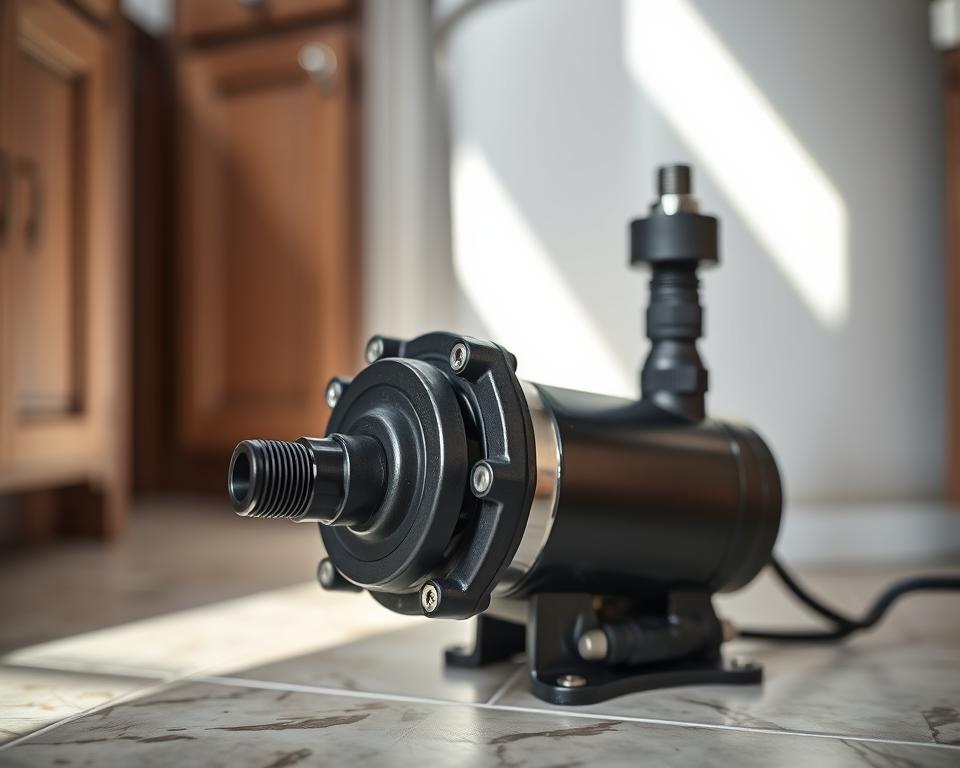RV Black Water Pump: Critical Care Guidelines
Is your RV’s black water pump really road-ready, or might it create camping woes? Preserving your motorhome’s waste system in excellent order is vital. It wards off nasty scents, blockages, and expensive damage. We’ll share important advice to guarantee your sewage pump runs smoothly, keeping your travels serene.
Getting to Know Your RV’s Plumbing System
The RV plumbing system is fundamental for any pleasant excursion. It splits into two main parts: the black water system and the gray water system – mobile RV pump out. The black water system holds waste from the toilet, whereas the gray water system manages wastewater from sinks and showers.
The systems employ drain lines that feed into different tanks, designed for streamlined waste management. Each tank has a vent to prevent gas from building up, keeping the operation is safe and scent-neutral. Proper waste management in an RV is paramount to avoid leaks or bad odors. By knowing both black and gray water tanks, RV owners can maintain and manage waste better.
Grasping how your RV’s plumbing works reveals issues in advance. Regular maintenance makes trips smoother for everyone. Taking initiative with your RV’s plumbing system assures reliability during your travels.
RV Tank Categories
Traveling in RVs involves being aware of the different tanks. Each one is vital to your RV’s system, needing regular upkeep.
The fresh water tank stores drinking water. It’s necessary for a comfortable RV experience.
The gray water tank holds sink, shower, and other non-Septic wastewater. Managing this tank keeps your RV hygienic while traveling. The black water tank, on the other hand, contains toilet waste. It needs routine emptying and meticulous maintenance to avoid issues.
By recognizing the fresh, gray, and black water tanks, RV owners can better handle their systems. This strategizing and regular maintenance ensure smooth running of the waste management system.
Operation of Black Water Tanks
The function of the black water tank is crucial in RV waste management. It stores waste from the toilet via a gravity-fed system. Upon flushing, waste and water are sent into the tank, to be stored until removal is necessary. It’s paramount to keep water levels optimized in the toilet to stop solid waste buildup.
Comprehending how RV waste tanks function can circumvent clogs and odors. Without proper care, solid waste hardens, creating blockages and emptying difficulties. Comprehensive tank flushing techniques are key to preventing these issues, securing smooth functionality.
Frequent inspection of tank mechanics is advised for RV owners. This includes observing flushing methods and sustaining adequate water flow. Practicing these essentials aids in efficient tank maintenance, averting expensive fixes later.

Vital Maintenance Tips for Your RV Black Water Pump
Performing regular maintenance on your RV’s black water pump is imperative. Begin with choosing RV-safe toilet paper to reduce clogs and better flow. A deep flush can eliminate waste and cut bad smells. Routinely cleaning the tank helps avoid residue buildup, guaranteeing your RV sanitary and comfortable.
Conduct routine inspections to monitor your pump’s condition. Search for any signs of wear or damage that could affect its function. Using specialized tank treatments, like those from All in Sanitation, can greatly raise both performance and cleanliness. Applying these tips can prolong your pump’s life and enhance your RV’s living conditions.
Use RV-Safe Toilet Paper
Maintaining your RV’s black water system includes vital steps. One prime tactic is using RV-safe toilet paper for clog prevention. This specifically designed product softens quickly in water, suited for RV sanitation systems.
RV-safe toilet paper is crucial for tank maintenance. It dissolves fast, preventing blockages from slow-decomposing materials. This boosts waste disposal efficiency and keeps the plumbing clear.
Opt for brands identified as RV-safe when buying toilet paper. These products lessen clog risks and extend your black water tank‘s lifespan by reducing buildup. Steady use guarantees a stress-free camping experience, void of plumbing troubles.
Complete Tank Rinsing
Deep-flushing your black water tank is key for smart waste management in your RV. To assist waste movement, make sure the toilet bowl is properly topped up before flushing. Many RVs are equipped with built-in tank flush systems to make the process more convenient. For RVs without this feature, using tank rinsers that attach to the sewer outlet offers a reliable alternative.
Consistent tank flushing supports waste removal and prevents solid accumulations and bad smells. Maintaining this process guarantees your RV stays free of odors, making your travels more comfortable. A habit of regular and complete tank flushing will improve hygiene and the overall condition of your RV’s plumbing system.
Prevent Build-Up with Regular Cleaning
Keeping your RV’s black water tank clear is crucial for its efficient function. Consistent cleaning washes away lingering waste inside the tank walls. This means scouring well with water and using specific RV tank cleaners for tough deposits.
By cleaning diligently, you halt odors and minimize clog risks. A well-maintained tank makes RVing better and helps your plumbing last longer. Add tank maintenance into your routine to guarantee smooth travels.
Picking Suitable Additives
Selecting correct chemicals for RV black water pump maintenance is key for managing waste and minimizing smells. Many RV enthusiasts employ enzyme-based RV holding tank treatments. These products employ good bacteria to degrade solids and cut down bad odors.
Shunning harsh chemicals is essential to prevent damage to your plumbing. Such substances can corrode pipes, leading to costly fixes and diminishing your RV enjoyment. Choosing safe chemicals for odor control ensures your tank and pump’s longevity.
Preserving your RV black water tank in peak form betters your travel experience. Using the right holding tank treatment regularly makes sure your system works well.
Proper Dumping Schedule
It’s crucial to empty your RV’s black water tank at the appropriate point for smooth emptying. Plan to dump when the tank is about two-thirds full is prudent. This sidesteps solid waste buildup, providing a simpler emptying process.
Disposing waste at designated stations is imperative for safe, eco-friendly waste handling. It’s crucial to track the tank‘s levels closely. Letting it fill completely can result in clogs and make disposal more difficult.
Good timing with correct methods are key for hygienic waste management and can lengthen your plumbing’s life. Remaining attentive and caring for the system well ensures a pleasant RV living experience.
Inspect and Maintain Seals
Inspecting seals around the toilet and tank is crucial for leak prevention. Over time, these seals might degrade, leading to odors and potential harm. A careful inspection will show any wear or damage. Finding issues early allows for quick replacement to ensure a secure connection and odor-free RV.
Keeping a bit of water in the toilet bowl supports in preserving seal condition. This protective habit is critical in RV seal upkeep. It increases the seals’ life, preventing leaks and foul odors.
Routine seal maintenance can forestall costly fixes later. By prioritizing seal health, RV owners deliver a pleasant journey.
Long-Term Care Suggestions
Arranging professional servicing for your RV at least once a year is prudent, particularly for black water tank care. This strategy helps in spotting issues sooner and upholds your plumbing system’s integrity.
When preparing your RV for storage, entirely clean and empty the black water tank first. Look into antifreeze to prevent damage from remaining water during cold seasons. Following this practice is important for preserving the system, ensuring it’s ready for your next adventure.
Steady reviews and preventive actions are essential to increasing your sanitation system’s life. Inspecting connections, hoses, and seals guarantees smooth operations. This mindset enhances your RV experience, making it enjoyable all year round.
Making sure your RV’s black water pump is well-maintained is essential for a stress-free camping journey. By observing the maintenance tips shared, you can preserve your black water system functioning well. It’s essential to focus on routine washing, applying correct flushing methods, and opting for appropriate chemicals for waste management.
By hitting these maintenance requirements, you will prevent unpleasant odors and blockages. This also extends your RV plumbing system’s durability. Proactive care of the RV black water pump leads to more time enjoying the outdoors, minus potential setbacks.
Bear in mind, proper upkeep is key next time you gear up for an outing. It’s not the highlight of RV ownership, yet it significantly boosts your travel experience.

